Daily Writing
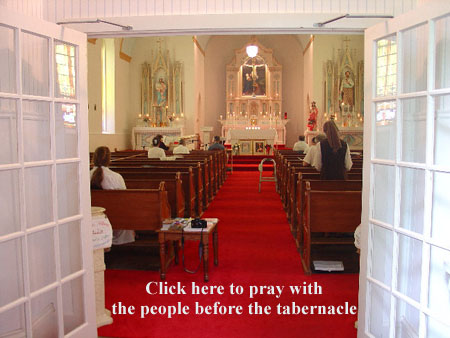
| Shepherds of Christ Daily Writing |
 |
December 16, 2008
|
December 17th Holy
Spirit Novena |
The Novena Rosary
Mysteries |
December 17, 2008 come to
building in Florida -
6:20 Prayer Service
Mailing Fr. Joe's book
I want to send to all priests I can in
United States - please
help with postage.
Postage can help this priest
ALL Year
Homilies Cycle B
ALL YEAR
Fr. Joe's book
AWESOME
Homilies Cycle B
Available $10.00 plus shipping
Call Kathleen
1-888-211-3041
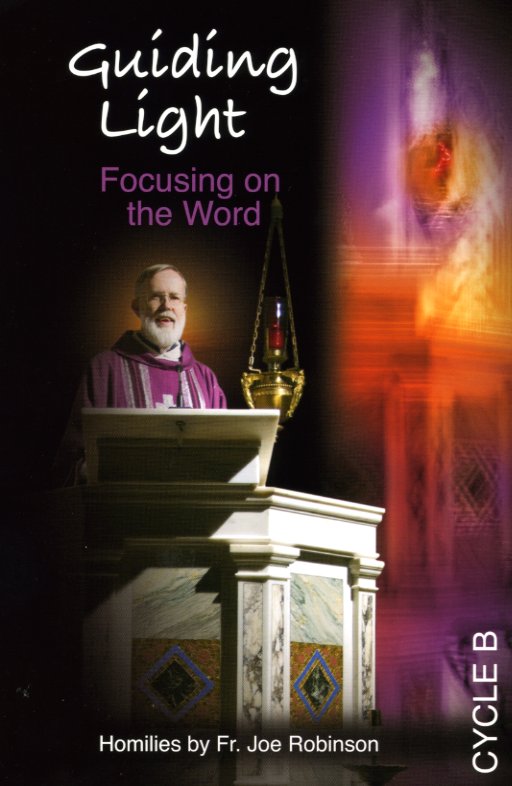
December 16, 2008
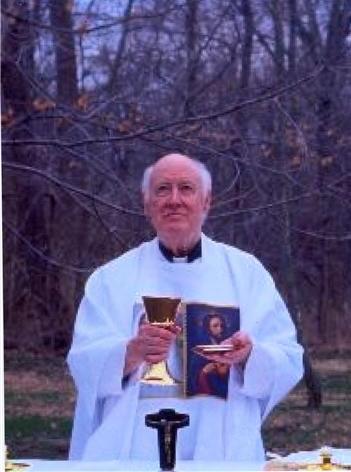
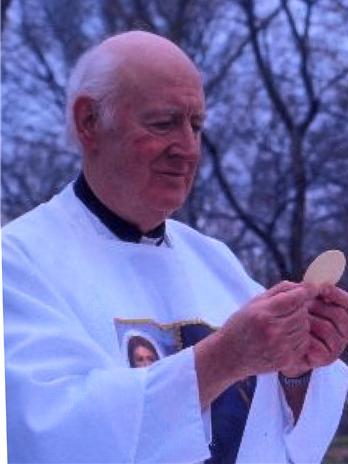
From Response in Christ
by Fr. Edward J. Carter, S.J.
The Christian Life of Grace
5Ibid., p. 39.In the pattern of death-resurrection, the Church continues the prophetic, kingly and priestly offices of Christ. She does not do this through a merely extrinsic activity, for her external action is an incarnation of a more fundamental reality, the life of grace, the Christ-life. Each member of the Church is called to develop this Christ-life to the fullest. In other words, each member of the People of God is destined for Christian holiness. Vatican II tells us this: "Thus it is evident to everyone that all the faithful of Christ of whatever rank or status are called to the fullness of the Christian life and to the perfection of charity. . . ."1 If all are not called upon to live out this life of Christian sanctity in exactly the same way, nevertheless all are called to the same essential holiness. Vatican II states: "In the various classes and differing duties of life, one and the same holiness is cultivated by all, who are moved by the Spirit of God, and who obey the voice of the Father, and worship God the Father in spirit and in truth. . . ."2
All are called to the same basic holiness because the life of grace, which is the life of holiness, is essentially the same for all.
1. WHAT IS GRACE?
Grace is first and foremost the lavish self-giving or self-communication of God to man through the person Christ. This is the stress of St. Paul. Contemporary theology therefore is correct in describing grace first of all in terms of the special presence of the Triune God. The divine persons are present to give us a participation in their own life, to be a guide of our actions, and to be known and loved by us. This special presence is variously named: the divine indwelling, the indwelling of the Trinity, uncreated grace. "If anyone loves me he will keep my word, and my Father will love him, and we shall come to him and make our home with him." (Jn 14:23).
Through this special presence, Father, Son and Holy Spirit unite themselves so intimately to us in personal love that their image is left upon us. This image of the Trinity is sanctifying grace. There are, then, two great realities of grace: God's personal self-communication, or uncreated grace, and created grace, or the life of sanctifying grace.
As we have just mentioned, God's gift of Himself in a special loving presence is the aspect of grace which should be stressed. But the reality of created grace—the life God gives us—should also receive its due attention. Scripture so bids us. The eminent biblical scholar, John L. McKenzie, after commenting on numerous New Testament passages, observes: "Wide as may seem to be the range of these passages, they have in common the conception of grace as something given, received, a reality in the Christian and in the world in which the Christian lives."3 Also, looking at the thought of St. Paul, we have the words of Rondet: "In First Corinthians, Paul's theology of grace takes a big step forward. He continues to speak of grace as a special mercy, a special goodness of God (1 Cor 1,3). But grace now also appears as a created gift, a permanent favor. It is a kind of supernatural power, and charisms in some way embody various aspects of it."4 Rondet speaks further about Paul's theology of grace: "In chapter 4 of Second Corinthians, grace appears clearly as an interior principle of spiritual life. It is no accident that Paul goes on to talk about the interior man, the 'inner nature which is being renewed every day' (4,16). . . ."5 Consequently, the reality of the life of sanctifying or created grace is very clear in the New Testament.
Created grace, or the life of sanctifying grace, actually inheres in us. On the other hand, the persons of the Trinity specially present to us (uncreated grace), despite their mysteriously close union with us, never become a part of our natures. Although the special presence of the divine persons and sanctifying grace always coexist, these two realities are nevertheless distinct.
Sanctifying grace is best described as a life. It is a sharing in divine life. This life is one of the great themes of St. John. In the theology of John the purpose of the Incarnation is precisely this—to reveal and communicate divine life to men.6 "I have come so that they may have life and have it to the full." (Jn 10:10).
God is bold and daring. Without God's revelation, who would dare to think that God offers man a share in His own divine life? In Their self-communication to us, and in their sharing of divine life with us, the Trinity truly offers us a daring challenge. They bid us to live life at its fullest, to live a life patterned after their own. Through the new powers which grace gives us, they inexorably call us to go out of our self-centeredness and live a life of dynamic love-relationships with Themselves and man. Through this life of love They ask us to continue the work of Their love, the work of creation and redemption. Through this life of love They ask us to help change the face of the earth. Summarily, our life in Christ is a call to the greatness of love.
To talk of grace, then, is primarily to talk of the personal relationships in love which are established by our Christ-life. These personal relationships we wish to stress in our treatment of grace. First of all, however, we should briefly discuss basic ideas concerning the life of sanctifying grace, which is the foundation for ability to enter into these personal relationships. All things being equal, the more we know about sanctifying grace, the better we can understand and appreciate the nature of these personal relationships in Christ.
Although the life of sanctifying grace is a reality distinct from our natural life, it is not something superimposed upon our nature as icing is added to a cake. Rahner states: "The nature of a spiritual being and its supernatural elevation are not opposed to each other like two things which lie side by side, so that they must be either kept separate or confused. The supernatural elevation of man is, though not due to him, the absolute fulfillment of his being. . . ."7
Our Christ-life permeates our persons completely. Nothing which is good is destroyed. All is elevated to a new level of existence, for through grace we enter a new life. St. Paul affirms: "And for anyone who is in Christ, there is a new creation; the old creation has gone, and now the new one is here." (2 Co 5:17)
Why are we able to live on a new level of existence through grace? The answer lies in the fact that we receive a created sharing in the divine nature. Nature, we know, is a principle or capacity of operation according to a certain level of existence. An angel can perform acts of an angel because he has an angelic nature. A man can know intellectually because he has a rational nature. Likewise, through our Christ-life of grace we can perform God-like acts because we have received a new nature. Scripture speaks to us about our participation in the nature of God. In one of the most noted passages of the New Testament on the life of grace, we read: "By His divine power, he has given us all the things we need for life and for true devotion, bringing us to know God himself, who has called us by his own glory and goodness. In making these gifts, he has given us the guarantee of something very great and wonderful to come: through them you will be able to share the divine nature and to escape corruption in a world that is sunk in vice." (2 P 1:3-4).
It is not sufficient that we possess this Christ-life, this new vital principle. Also we need the supernatural faculties through which this Christ-life can both express itself and grow. This is evident if we consider our natural life as an analogy. It is not sufficient to possess a human nature. The life of this nature has to express itself and grow through various sense and spiritual faculties. For instance, one expresses his life as a man when he uses his intellect or when he walks.
What are the supernatural faculties through which my Christ-life expresses itself and grows? These faculties are the supernaturally infused virtues, chief of which are faith, hope and love. These virtues give the Christian the capacity to channel his Christ-life into the various areas of his total existence. Or to put it in a slightly different manner, we can say that these virtues allow the Christian to relate properly to God, man and the rest of creation. They are positive modifications of the person, allowing him to act with various Christian attitudes. The virtues, in turn, are activated by actual grace which affects both our intellects and our wills.
God has given the Christian still another gift of grace. We refer here to the gifts of the Holy Spirit. These gifts are capacities which allow the Christian in a special manner to be receptive to the inspirations of the Holy Spirit. These gifts, in turn, have as their purpose the perfecting of the infused virtues. Theologians teach that the virtues do not achieve a mature stage of development without the simultaneous activity of the gifts.
Another important aspect of grace is that which is termed external. External actual grace is a person, place or thing which serves as an occasion for internal grace. We must realize the extreme importance of external grace, especially concerning persons. There are many examples. A wife can receive God's grace through the loving presence of her husband. The witness of a dedicated Christian can inspire us to greater things. The love and encouragement of a friend can spur us to a more generous self-giving in the work of Christ. Yes, persons are extremely important in God's plan.
How does our Christ-life grow? This growth centers around the themes of love. Our Christ-life grows as we open ourselves up to God's love in the sacraments, especially the eucharist. We grow in Christ through the love of God and man which is expressed in various types of meritorious actions performed in the state of grace. We grow in Christ when God in His love graciously answers our prayers through which we have petitioned Him to take deeper possession of us through, for instance, an increase of faith, hope and love. In summary, we grow in our Christ-life through the various dimensions of loving relationships with God and others. Love is all important. The other virtues are important to the degree that they are influenced by love and serve love.2. THE GRACED CHRISTIAN AND VARIOUS RELATIONSHIPS
Our life of grace establishes various relationships between the Christian, God and the rest of creation. The first to be considered is that between the Christian and the persons of the Trinity.
We should first give brief attention to certain theological principles and truths which have a relevance to any discussion involving our relationship to the three divine persons. One of these theological principles is that of appropriation. This is a mode of predication by which the properties and activities common to the three divine persons are especially attributed to one of the persons because of a property peculiar to this particular person. For instance, because of His fatherhood, we refer to God the Father as our Creator, although all three persons equally create. Therefore, we really have no proper relationship to the Father as our Creator, but only one based on appropriation. The process of our sanctification is also an action common to all three persons. But because it is a work of God's love for us, and since the Holy Spirit is the love existing between Father and Son, we appropriate sanctification to the Holy Spirit.
This principle of appropriation preserves the traditional Catholic teaching that all divine activities ad extra (outside of God) are common to the three persons. At the same time it manifests the differences between the divine persons and properties.
Yet many contemporary theologians are not satisfied in appealing only to the principle of appropriation as they strive to explain the relationship between the Christian and each of the divine persons. They maintain that scripture does not always seem to speak in an appropriated sense in describing our union with the Father, Son and Holy Spirit. Consequently, while adhering to the above principle concerning God's activity outside Himself, contemporary theologians are discussing the question of proper relationships between ourselves and each person of the Trinity. They do this by appealing to other than efficient causality. For instance, certain theologians, such as Karl Rahner, appeal to a quasi-formal type of causality in explaining the theology of the indwelling of the Trinity in the justified man.8 Such an explanation, not based on the principle of appropriation, allows for a proper and more personal relation between the justified man and the three distinct persons.
Let us also note that in speaking of the Christian's union with Christ as man, there is the question of a proper and special relationship. This is true because among the divine persons only the Son possesses a human nature.
We have constructed our framework of reference for discussing the role of Father, Son and Holy Spirit in our lives. Having once established it, we are consequently relieved of the burden of describing in each instance the type of relationship we are discussing, whether it is based on appropriation or not.
a) Relationship with the Father
The Heavenly Father has put each of us upon this earth because of His singular love for us as individuals. There is a countless number of merely possible human persons existing in the divine knowledge. Why has the Father given existence to me rather than to these "possibles" who will never exist? The ultimate answer lies in the mysterious free will of the Father. He has chosen to love me, to give me existence, to give me a grace-life.
In His love for me the Father has entrusted me with a great purpose. I have a loving service to give to God, to the Church, and to the world—a service which no one else can render. Each of us has been put here to fulfill a mission, to use our lives, not only for ourselves, but to labor through these lives for the glory of the Father and the benefit of men.
We tend to underestimate the value of our lives. Perhaps this is so because our faith is not what it should be. We would be astounded if we could see the potential of our lives as does our heavenly Father. We are great, not because of what we are in ourselves, but because of what our Father has already done for us, and because of what He wants to do for us—if only we allow Him.
Perhaps we would not be constantly tempted to underestimate the worth of our lives if we more often reflected upon some of the great examples of what God can accomplish through the life of one person. There has been a St. Augustine, a St. Dominic, a St. Francis of Assisi, a St. Thomas Aquinas, a St. Elizabeth, a St. Ignatius Loyola, a St. Thomas More, a St. John Vianney and many others. In and through their various vocations they have contributed profoundly to the work of Christ. Coming closer to our own day we have the example of Pope John XXIII and Dr. Thomas Dooley. These two lives, have they not left an indelible imprint upon the world of men? Can one life make a great difference to Church and world? The answer is obvious.
And yet, you might object, the examples just cited are lives of outstanding men and women. After all, how many are destined to walk across the stage of life in such dominant display before the eyes of men? We acknowledge, not very many. But there could well be numberless lives, almost completely hidden to the world, which have also contributed greatly to the cause of Christ. Perhaps, even, these hidden lives have at times given more to Christ and the world than have the lives of the canonized saints. God's ways are not always our ways, nor are His thoughts always our thoughts. Our heavenly Father can make use of the most obscure and insignificant life to accomplish great things.
Each Christian must strive to grow in the realization that the Father calls him to greatness. He accomplishes this purpose by the gradual development of his Christ-life. Whatever our particular purpose or mission in life may be, it will be authentically accomplished in proportion to the development of our grace-life in Christ. For our destiny in Christ includes all else. Our life of grace, in turn, develops around the all-embracive theme of the Father's will. The Father's will for me is what gives unity to my life. If I embrace this will, it holds together all the multitudinous threads of my existence, weaving them into a meaningful pattern—the achievement of my life's purpose.
Consequently, to grow in Christian holiness and to achieve my mission in life are supremely possible for me. Why? Because growth in the realization of my life's task is always commensurate with my Father's will for me here and now. His will for me is always proportionate to my present weakness on the one hand, and, on the other, to my present degree of spiritual maturity. Finally, His will for me always carries with it the necessary graces for accomplishing what He here and now asks.
As I reach out for my Father's will in love day after day, I am thereby dynamically developing my Christ-life, achieving my destiny, making my very important contribution to the evolving redemptive work of Christ.
The Father's will touches everything in my life. It wants to make all contribute to my growing maturity in Christ. Joy and sorrow, success and failure, work and play, ecstatic happiness and deep suffering, all of these are to be related to my Father's will. If I correspond to God's grace, His will as it permeates my total being and existence will unfailingly transform me.
As the Father's will transforms me, it thereby makes my life a success for myself and others. The only true measure of a successful life, despite possible appearances to the contrary, is whether or not it is conformed in love to the Father's will. The degree of success depends upon the degree of conformity. " 'It is not those who say to me, "Lord, Lord", who will enter the kingdom of heaven, but the person who does the will of my Father in heaven. When the day comes many will say to me, "Lord, Lord, did we not prophesy in your name, cast out demons in your name, work many miracles in your name?" Then I shall tell them to their faces: I have never known you; away from me, you evil men!' " (Mt 7:21-23).
The above described Christian life is certainly impossible without God's grace. We must be deeply aware that grace is a gratuitous gift which we cannot achieve by our natural efforts. But God offers grace in abundance. Our problem is that we do not respond to grace as we should. We tend to minimize the Father's great designs for us. We are tempted not to take His words at face value, those which tell us of the fathomless love He has for each one of us, and what that love can accomplish in us. To help ourselves maintain the proper perspective in these matters, we should often remind ourselves of these words of St. Paul: "We were still helpless when at his appointed moment Christ died for sinful men. It is not easy to die even for a good man— though of course for someone really worthy, a man might be prepared to die—but what proves that God loves us is that Christ died for us while we were still sinners. Having died to make us righteous, is it likely he would now fail to save us from God's anger?" (Rm 5:6-9).
We have, therefore, an irrevocable and overwhelming testimony of the Father's love for us. Because of this love, the Christian can increasingly assimilate the Father's will in his own response of love. Through this mutual self-giving, God and the Christian are meant to be united in the deepest possible love.
The above passage from St. Paul not only tells us of the Father's great love for us, but it also tells us that this love has come to us through Christ and continues to do so. There is no other way. This is the eternal design of the Father. Our grace-life as well as all creation takes its meaning from Christ: "He has let us know the mystery of his purpose, the hidden plan he so kindly made in Christ from the beginning to act upon when the times had run their course to the end: that he would bring everything together under Christ, as head, everything in the heavens and everything on earth." (Ep 1:9-10).b) Relationship with Christ
Scripture, then, indicates the necessity of seeing our grace-life in its relationship with Christ. It is rather amazing that dogmatic theology in its treatment of grace has traditionally said so little about Christ. With a bit of sarcasm, Rahner says: "The tractate de Gratia is commonly entitled de Gratia Christi. Commonly it contains little else about Christ. And yet we only have a Christian understanding of grace when it is conceived of not only in the most metaphysical way possible, as a divinization, but rather as assimilation to Christ. And the existential transposition of this is the following of Christ. . . ."9
How is this assimilation to Christ which Rahner speaks of initiated? Our life in Christ begins in a formal, ecclesial manner with baptism of water—notice, we are not saying that the grace of Christ cannot be had without baptism of water. As baptism marks us as members of the Church, it also indelibly imprints upon us the image of Christ.
The life of the Christian, consequently, is a development of the image of the Incarnate Word given in baptism. The Christian, as he grows in grace, is being shaped more and more after this image of Christ: "We know that by turning everything to their good God co-operates with all those who love him, with all those that he has called according to his purpose. They are the ones he chose specially long ago and intended to become true images of his Son, so that his Son might be the eldest of many brothers." (Rm 8:28-29).
The Christian requires motivation if he is to allow this Christ-likeness to permeate his existence more and more. The Christian must strive to catch a glimpse of that burning vision of St. Paul. For Paul, Christ was the fiery center of an intense existence: "Life to me, of course, is Christ, but then death would bring me something more; but then again, if living in this body means doing work which is having good results—I do not know what I should choose. I am caught in this dilemma: I want to be gone and be with Christ, which would be very much the better, but for me to stay alive in this body is a more urgent need for your sake." (Ph 1:21-24).
Each Christian, according to the graces God gives him, can model his life after the example of Paul. Each of us also can make Christ the dynamic center of our existence. If we dare to live in this way, Christ will fulfill us; for in Christ we possess everything else. In Him we are deeply related in love to God, man and the whole of creation. To develop as fully as possible the image of Christ implanted through baptism is to exercise the only fully true life. So has the Father willed it.
You will remember that we also spoke of the persons of the Trinity imprinting their image upon us as they communicate the life of sanctifying grace. What is the connection between the image of Christ and the image of the Trinity, both imprinted upon the Christian? The connection between the two lies in the fact that the life of grace, the image of the Trinity, comes to us through Christ and is to be lived according to the pattern established by Christ. Our life of grace is indeed a share in Trinitarian life. But we must live out this Trinitarian life according to the basic manner in which Christ lived out the grace-life in His own human nature. Here we emphasize the fact that Christ as man possessed His own life of sanctifying grace.
Why must our life of grace be modeled on Christ's grace-life? We cannot give others sanctifying grace. But the man Christ, head of the human race, does give men a share in the life of sanctifying grace which He possesses within His human nature. Theologians call this grace to be given to His members the grace of Christ the Head. Our life of grace, consequently, since it is the grace of Christ, has been structured according to the modalities or characteristics implanted by Christ. Christ established this structure as He exercised His own life of grace in His human, historical existence. While not claiming to be exhaustive, we will now examine various characteristics of Christ's life of sanctifying grace. Through such a procedure we thereby understand various characteristics and thrusts of our own life of grace.
First of all, Christ's life of grace was filial. The dynamism of this particular modality always led Christ to a perfect, loving service of His Father. His Father's will was all in all to Him. It was the guiding principle of everything He did, of everything He thought, of everything He spoke. Zeal for His Father's glory consumed Him. He would not rest until the work of the Father which he had been sent to accomplish was fulfilled in every detail. To love the Father's will was Christ's attitude towards life. He would cling to this principle even at the expense of a death of excruciating agony in body and soul. The words which Christ uttered in Gethsemane perfectly sum up His existence as man: " 'My Father,' he said 'if this cup cannot pass by without my drinking it, your will be done!' " (Mt 26:42).
Christ's life of grace was also salvific. His life always had that very obvious dimension of being orientated in love to man's good. All of Christ's life as man, swelling up from the unfathomable depths of the most intense love, was redemptive. Everything He did was gradually accomplishing a change in man's stance before the Father. He was bringing man from a state of enmity to a state of friendship and sonship with the Father. Christ's life, then, was magnificently selfless. Guided by love of His Father's will, He gave Himself completely to men. He gave until there was nothing more to give. This is the poignant beauty of Christ's life.
Christ's grace-life was also social, communal and ecclesial. His redemptive work was directed towards drawing all men together in a deep bond of love as brothers of a common Father. The establishment of His Church would perennially guarantee that there would be a visible source of grace for a growing sense of community among men. At the same time, this Church, the People of God, is intended to give a visible example of how the Lord desires men to be united in mutual bonds of love.
Christ's life of grace tended toward an epiphany. That is, it tended toward sacramentality, toward a manifestation of divine realities in space and time. Christ's grace-life, working through His sacred humanity, used the ordinary events and conditions of human existence and the created things of man's world to reveal the Father and the Father's plan for men.
Christ's life of sanctifying grace was also transfigurative. Christ did not come to suppress, but to elevate. He came to transform—to transfigure—man and his world. Anyone who considers Christianity to be a negative religion does not really understand the work of Christ.
These are some of the chief modalities or dimensions of Christ's life of grace. These modalities, in turn, were concretely expressed through the various mysteries or events of Christ's human life. Central to these mysteries were His death and Resurrection. We will discuss these mysteries of Christ at greater length in the chapter devoted to the liturgy. For it is within the eucharistic liturgy that we encounter the mysteries of Christ in a very special manner.
At this point we again remind the reader of the connection between Christ's life of sanctifying grace and our own. Rahner puts it very succinctly: "And yet every grace has analogously the same structure as its source, viz. the structure of the Word become man. . . ." l0
Consequently, as Christ's life of grace was filial, salvific, social, communal and ecclesial, so must be ours. As Christ's grace-life was sacramental (tending toward manifestation) and transfigurative, so likewise must be ours. Finally, let us remember that the Christian expresses these various dimensions of grace as he relives the mysteries of Christ, especially those of death-resurrection.
We have briefly considered the relationship between the graced-Christian and Christ. As this relationship grows in mutual love, the Christian understands with maturing penetration what it means to be incorporated into Christ Jesus. He becomes more aware of the full implications of St. Paul's words: "I have been crucified with Christ, and I live now not with my own life but with the life of Christ who lives in me." (Ga 2:19).c) Relationship with the Holy Spirit
After the glorified Christ was established in power and glory with the Father, He sent the Holy Spirit to sanctify the world. The task of the Holy Spirit is to imprint the mystery of Christ ever more deeply upon the whole of creation. The Holy Spirit gradually is leading man and his universe to a greater Christo-finalization. This Christo-finalization will reach its completion at the time of Christ's second coming. Then creation will receive its final transformation. Then the movement of creation to the Father, in Christ, by the Holy Spirit will be complete.
As this process evolves, the Holy Spirit concentrates His action upon the Church of Christ; for this evolutionary movement of creation in Christ has as its dynamic center the evolution of the Church. The Church progressively evolves by assimilating more perfectly the mystery of Christ. The Holy Spirit guides this process. He is the soul of the Church because He constantly labors to unite the diversified elements of the Church into a more perfect image of Christ.
The Holy Spirit as sanctifier not only guides the entire Church, but He also guides each member of the Church. Here again His task is basically the same. He strives to deepen the image of Christ which has been indelibly imprinted upon the Christian. He labors to Christo-finalize more radically all areas of the Christian's existence. In this regard we notice the biblical distinction of living according to the Spirit rather than according to the flesh. To live according to the flesh does not refer only to sins against chastity. It refers to anything in my life which is not according to the Spirit. Therefore, intellectual pride, something very "spiritual," would be living according to the flesh in the biblical sense.
On the other hand, to live according to the Spirit can include the most intense involvement with material creation or use of the senses. All of this can be profoundly Christian as long as we are following the lead of the Holy Spirit. In this context we again emphasize that everything about the Christian has been elevated by grace, not merely his spiritual nature.
To live fully according to the Spirit demands a growing realization of the manner in which the Holy Spirit leads the Christian to a greater Christ-likeness. This involves discernment of spirits. This concept will be developed at some length in a later chapter.
In summary, the Holy Spirit promotes the process of our becoming sons in the Son. The Christian's response to the Spirit measures his degree of incorporation into the adoptive sonship of the Christ-life. "Everyone moved by the Spirit is a son of God. The spirit you received is not the spirit of slaves bringing fear into your lives again; it is the spirit of sons, and it makes us cry out, 'Abba, Father!' " (Rm 8:14-15).
d) Relationship with Mary
Karl Rahner tells us that devotion to Mary is one of the great signs of final perseverance.11 By such a statement Rahner emphasizes for us the great role Mary exercises in the life of the Christian. Really, the emphasis of Rahner is merely a continuation of the great importance attributed to Mary by the Fathers, doctors, and saints of the Church throughout the ages.
Mary assumes such a concrete importance in the life of each of us because she is the mother of the Church and the mother of each Christian. She is a mother to all men, but in a special way to the Christian.12
Mary's spiritual motherhood toward us had its beginnings at the time of the Incarnation. As Mary conceived Christ in a physical manner, she at the same time conceived us in a spiritual manner. In her holy womb she bore both Christ, the Head, and us, His members.
The second great stage in Mary's maternal relationship toward us was accomplished upon Calvary. There, in extreme spiritual suffering, she offered Christ to the Father. From the pierced side of Christ the Church was born. Mary, in the extreme anguish of spiritual childbirth, brought us forth to supernatural life. "Seeing his mother and the disciple he loved standing near her, Jesus said to his mother, 'Woman, this is your son'. Then to the disciple he said, 'This is your mother.' " (Jn 19:26).
The third and final phase of Mary's spiritual motherhood is a continuing process. Under God, she gives us our life of grace. In her maternal love she protects and nourishes this life. She intercedes for all the graces necessary for its proper growth. As Mary cooperated with the Holy Spirit in first giving Christ to men, so she continues the same cooperation in regard to each Christian. Through the life of grace Christ is meant to take deeper and deeper possession of each one of us. Mary and the Holy Spirit continually labor to achieve this. Mary's only desire for us is that we grow more and more into the full stature of Christ. Her overwhelming love for us is evident. We manifest our love for her by committing ourselves to her maternal love and care so that she can achieve her desired purpose. That purpose, again, is to form Christ in us.
e) Relationship with Members of the Church
There is but one true Church of Christ. Yet this one Church has three different states of existence. There is the pilgrim Church, the Church of this world, composed of members who have received the grace of Christ and strive for its development. They have not yet obtained the goal of their efforts, as have the members of the heavenly Church, who enjoy God in eternal happiness. The Church suffering is an intermediate state of existence necessary for those who had not achieved the required purification as members of the pilgrim Church. Although there are these three phases of the Church's existence, there is a profound union existing between all the members. All these members possess the same basic life of grace in Christ, and this common life establishes the most intimate bonds of love. In our preceding chapter, we discussed the pilgrim Church. Let us now consider the Church suffering and the heavenly Church.
The members of the Church suffering are those who have departed from this life in an incomplete state of Christian development. Their development is incomplete in the sense that grace has not fully taken possession of them, and, as a result, they are yet closed in upon themselves to a greater or lesser degree. They as yet cannot open themselves out in complete love to the Triune God in the beatific vision. They must undergo a further purification, a purification which could have been achieved upon earth with merit. Now the purification must be achieved with no merit attached. The pain of this purification is mixed with the certain expectation of achieving the vision of God. We can hasten the advent of this vision for this people by the offering of prayers and other good works. Scripture itself refers to our action on behalf of those in purgatory in Chapter 12 of the Second Book of Maccabees beginning with verse 38.
The members of the heavenly Church are those in whom the life of grace has taken full possession and has reached its completion in the life of glory. Faith now is unnecessary, as the light of glory gives the human intellect a new strength and capacity for seeing God face-to-face. While the Christian was a wayfarer, he received the imprint of the indwelling Trinity as he shared in God's own life. Now in heaven that grace-life and possession of God reaches its completion—the absolute completion is not achieved, however, until the resurrection of the body. The divine persons give Themselves to the beatified in a profound union far surpassing that of the indwelling of the Trinity experienced here below.
This life of heaven is still the Christ-life, for just as we possess a share in Trinitarian life here below as mediated by Christ, and exercise this grace-life as structured by Him, so also in heaven is the mediation of Christ present. In the words of Rahner, "One always sees the Father through Jesus. Just as immediately as this, for the directness of the vision of God is not a denial of the mediatorship of Christ as man."13 And not only does the humanity of Christ unite the blessed to God, but also, in some way, to the whole of creation. This is merely a completion of what is begun here below, namely, the union with Christ in His humanity establishing the Christian in a special relationship with God, with other men, and with the whole of creation. We have a glimpse, therefore, of the fullness of life which members of the heavenly Church possess.
The heavenly Church, as St. Thomas says, is the true Church.14 The Church of this earth and the Church of purgatory are, each in its own way, reaching out in loving hope for the heavenly Jerusalem. Vatican II puts it very simply: "The Church, to which we are called in Christ Jesus, and in which we acquire sanctity through the grace of God, will attain her full perfection only in the glory of heaven."15
The members of the heavenly Church can help us in living our life of grace until we too share its fullness with them. Their power of intercession on our behalf is but another ramification of the communal aspect of Christianity. We are meant to help others grow in Christ. We, in turn, are intended by God to receive aid from others—yes, from members of the heavenly Church, as well as from those with whom we dwell here below.
Not only can we be aided by the saints' intercession, but the example of the canonized saints can also be of great value to us. They have concretely proved that full holiness is possible. Such an inspiration is of real worth when we are tempted to think that Christian sanctity in its higher degrees is impossible of attainment. Moreover, the canonized saints, in their diversity, teach us that there are many authentic versions of Christian holiness. They can be innovators in showing us that there are numerous possibilities in assimilating the mystery of Christ, although the basic assimilation remains the same for all Christians of all times. In the opinion of Rahner this is one of the chief roles the canonized saints exert in the life of the Church.16
f) Relationship with Man and His World
The Christian's Christ-life also establishes a special relationship between himself and all other men and the world in which both are situated. This is so because of the basic nature of grace—the fact that it is a share in God's life. The object of life in God is not only Himself, but also His creation. The Christian, through his life of grace, shares in this double dimension of God's life. Just as God not only loves Himself, but also His creation, so also must the Christian love both God and His creation. The Christian is called in a special way to further the creative and redemptive work of God.
This aspect of the Christian's grace-life is also mediated by Christ. Christ, through His human enfleshment, has immersed Himself into man's world. Through His humanity he unites all men and all authentic human and temporal values to Himself. Through His redemptive love Christ has elevated the Father's creation to a new level of existence. Christ has initiated a process of gathering up all of creation for the glory of His Father. This process will reach its completion at the parousia. Meanwhile the Christian labors with Christ to further this evolutionary process of creation and redemption. Consequently, in faith, hope and love, the Christian assumes a new responsibility and privilege toward man and his world.
He must take this privilege and responsibility seriously. Men of our era such as Bonhoeffer and Teilhard de Chardin have strikingly placed this responsibility before Christianity. Christianity has to show the contemporary world that it is profoundly interested in all its authentic values and aspirations. Christianity must further demonstrate that the principles of Christ are the only ones which can guarantee the true progress of man's world. The world belongs to Christ and it is impossible for it to develop authentically outside of Christ.
We have traversed a rather wide area in this chapter dealing with the life of Christian grace. Grace, in its inner reality, and in its various relationships and ramifications, is complex to a certain extent. But ultimately it has a profound simplicity and unity. Christ is the one who gathers up and unifies. He is the one who makes grace tangible, concrete and personal to the Christian. Radically, the life of grace is life in God as mediated by Christ. "We can be sure that we are in God only when the one who claims to be living in him is living the same kind of life as Christ lived." (1 Jn 2:5-6)._______
1Constitution on the Church, No. 40.
2Ibid., No. 41.
3John L. McKenzie, Dictionary of the Bible (Milwaukee: Bruce, 1965), p. 325.
4H. Rondet, The Grace of Christ (Westminster, Maryland: Newman, 1966), p. 37.

Available $10.00 plus shipping
Call Kathleen
1-888-211-3041
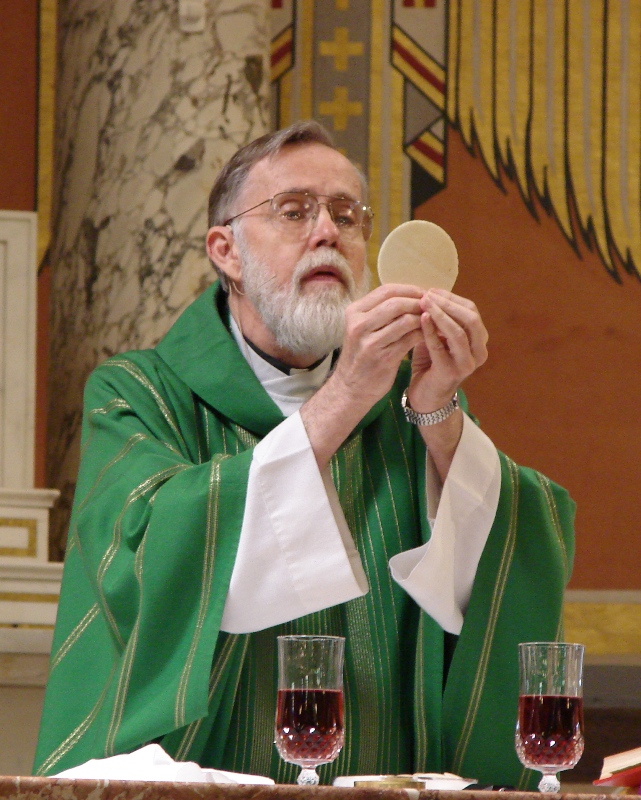
From Fr. Joe's Homilies - Cycle B
4th Sunday of Advent
2 Samuel 7: 1-5, 8b-12, 14a, 16
Once the king had settled into his palace and Yahweh had granted him rest from all the enemies surrounding him, the king said to the prophet Nathan, 'Look, I am living in a cedar' wood palace, while the ark of God is under awnings." Nathan said to the king, 'Go and do whatever you have in mind, for Yahweh is with you.' But that very night, the word of Yahweh came to Nathan: 'Go and tell my servant David, "Yahweh says this: Are you to build me a temple for me to live in?
"Yahweh Sabaoth says this: I took you from the pasture, from following the sheep, to be leader of my people Israel; I have been with you wherever you went; I have got rid of all your enemies for you. I am going to make your fame as great as the fame of the greatest on earth. I am going to provide a place for my people Israel; I shall plant them there, and there they will live and never be disturbed again; nor will they be oppressed by the wicked any more, as they were in former times ever since the time when I instituted judges to govern my people Israel; and I shall grant you rest from all your enemies. Yahweh furthermore tells you that he will make you a dynasty. And when your days are over and you fall asleep with your ancestors, I shall appoint your heir, your own son to succeed you (and I shall make his sovereignty secure.
I shall be a father to him and he a son to me; if he does wrong, I shall punish him with a rod such as men use, with blows such as mankind gives.
Your dynasty and your sovereignty will ever stand firm before me and your throne be for ever secure." '
Romans 16: 25-27
And now to him
who can make you strong
in accordance with the gospel that I preach
and the proclamation of Jesus Christ,
in accordance with that mystery
which for endless ages was kept secret
but now (as the prophets wrote)
is revealed,
as the eternal God commanded,
to be made known to all the nations,
so that they obey in faith:
to him, the only wise God,
give glory through Jesus Christ
for ever and ever. Amen.
Luke 1: 26-38
In the sixth month the angel Gabriel was sent by God to a town in Galilee called Nazareth, to a virgin betrothed to a man named Joseph, of the House of David; and the virgin’s name was Mary. He went in and said to her, ‘Rejoice, you who enjoy God’s favour! The Lord is with you.’ She was deeply disturbed by these words and asked herself what this greeting could mean, but the angel said to her, ‘Mary, do not be afraid; you have won God’s favour. Look! You are to conceive in your womb and bear a son, and you must name him Jesus. He will be great and will be called Son of the Most High. The Lord God will give him the throne of his ancestor David; he will rule over the House of Jacob for ever and his reign will have no end.’ Mary said to the angel, ‘But how can this come about, since I have no knowledge of man?’ The angel answered, ‘The Holy Spirit will come upon you, and the power of the Most High will cover you with its shadow. And so the child will be holy and will be called Son of God. And I tell you this too: your cousin Elizabeth also, in her old age, has conceived a son, and she whom people called barren is now in her sixth month, for nothing is impossible to God.’ Mary said, ‘You see before you the Lord’s servant, let it happen to me as you have said.’ And the angel left her.
December 18, 2005
INTRODUCTION: (2 Samuel 7,1-5, 8b-12, 14a,16; Luke 1,26-38) Our first reading goes back 1000 years before Christ to the time of king David in Jerusalem. You need to recall that when Moses led the people of Israel out of Egypt, almost 300 years before King David, God gave the people a special sign of his presence among them. That sign was the Arc of the Covenant. It looked something like this: a box in which were placed the 10 Commandments, a lid of gold and on the lid were two angels. The box was carried by two long poles because no one could touch the Arc. The two angels provided a throne for their invisible God, Yahweh. As Moses and the people moved through the desert and eventually into the promised land, the Arc was kept in a tent. Only designated people, and eventually only the high priest, could enter the tent and offer sacrifice to God. The Arc was still kept in a tent during the reign of King David. David had built himself a nice comfortable palace and he decided it was not right that the Arc, the special sign of God’s presence with his people, was still kept in a tent. So he told his prophet, Nathan, that he would build a temple, a house for God. Nathan said “good idea,” but God said “no.” God said David had shed too much blood in his role as king, so he would have David’s son, Solomon, build the temple after David died. But God was pleased with David’s idea and blessed him. One of the special blessings David received was that David’s line would never die out. One of his descendants would always be king over God’s people. That’s what is meant by the statement that God would “establish a house” for David. For about 400 years this proved to be true. Always the king of Judea was of the royal house of David. When the Babylonians conquered the Jews, that was the end of the kingship. But the Jews never forgot the promise God made to David and always waited for one who would come from David’s family who would rescue God's people from their enemies and restore the kingdom to Israel. Since kings were anointed when they assumed power, the king they looked for was called the anointed one – the Hebrew word for “anointed one” is Messiah, in Greek the word is Christos. In the gospel of the annunciation, the angel Gabriel informs Mary that her son would be the fulfillment of these hopes. “The Lord God will give him the throne of David his father, and he will rule over the house of Jacob forever, and of his kingdom there will be no end.”
HOMILY: The angel Gabriel announced the birth of a king: “the Lord God will give him the throne of David, his father, and he will rule over the house of Jacob forever, and of his kingdom there will be no end.” I love the interesting way St. Luke begins to tell us about this. He first of all introduces Mary, but not in the usual way we introduce someone. We would have said, “I would like you to meet Mary. She’s from Galilee and engaged to be married to Joseph.” None of us would have dared to add to our introduction: “She’s a virgin!” But it’s a very important thing St. Luke wants us to know and he tells us she’s a virgin even before he tells us Mary’s name. Why? Because Mary would conceive in a miraculous way, through the power of the Holy Spirit. That alone was spectacular, but that was only the beginning of the most unique and wonderful event this world would ever see. This king, who would be conceived by the power of the Holy Spirit, would be more than the ordinary, run of the mill king. This king, the messiah, the christos; that is, the anointed one, would be king over a kingdom that would never end. To top that, because he was conceived by God’s own Spirit, he would be the “Son of God.”
This is an awesome mystery that God took on our human flesh and became like us in every way except sin. There is a special theological term for it: the Incarnation. The God, who dwelt among his people housed in a tent for many generations, now comes to live with his people as one of us, taking on our own flesh and blood. Sometimes people like to say Jesus was a great prophet or a great teacher or a great humanitarian but that’s all he was. The gospels tell us he is the Son of God. If he was less than that, there was nothing great about him because he was a crazy man, full of delusion and paranoia. There is no in-between position we can take on Jesus. [In today’s bulletin is a copy of the Catholic Update that gives a beautiful explanation of today’s gospel. I highly recommend it.]
How we live our faith depends on how firmly we believe in this wonderful event. If we truly believe God has come into our world and into our lives through Jesus, shouldn’t we try to spend time with him, shouldn’t we try to get to know him better and follow him as well as possible? If we are not ready to do that, could it be that our faith is little more than a lot of words?
One last thought. I would like you to notice the respect God showed Mary in the annunciation. God didn’t just tell her she would be the mother of such an awesome person. God asked her if she would be and waited for her answer. We have here a cue for how the Son of God can come to us more fully. We have here a cue for how Christmas can fully fill our hearts. We have here a cue for how to enjoy the blessings of his kingdom that will have no end. God's Son wants to live in each of us. As God did with Mary, God waits for each of us to answer him as to whether he is welcome. Are we able to say as Mary did: “I am the servant of the Lord. I will do whatever you want of me, Oh God.”

Shop for Christmas Gifts!
Call Kathleen
1-888-211-3041
812-273-8405
1-888-321-7671
Fr. Carter's Books
|
Priestly Newsletter Book I
12 Newsletters $12.00 |
17 Newsletters $12.00 |
Priestly Newsletter Book 3
4 Newsletters &
Prayers $12.00 |
|
|
Spirituality
Handbook |
Tell My People |
$10.00 |
|
|
Tell My People Spirituality Handbook
|
$10.00 |
$10.00 |
Call Kathleen
1-888-211-3041
812-273-8405
1-888-321-7671
God’s Blue Books
|
God’s Blue Book 1 – $10.00 |
God’s Blue Book 4
–
$5.00 |
|
God’s Blue Book 2 –
$10.00 |
God’s Blue
Book 5 –
$5.00 |
|
God’s Blue Book 3 –
|
God’s Blue
Book 6
–
$10.00 |
Rosary Books
Statues
|
Our Lady of Mt. Carmel
|
Our Lady of Lourdes
|
Our Lady of Grace
|
|
|
|
|
|
Sorrowful Mother
|
Immaculate Heart - Ivory
|
Immaculate Heart of Mary
|
|
|
|
|
|
Limpias
|
Sacred Heart of Jesus -Blessing
|
Sacred Heart of Jesus
|
|
|
|
|
|
Infant of Prague
|
Divine Mercy
|
Holy Family
|
|
|
|
|
|
|
Our Lady of Guadalupe
|
Holy Family
|
|
|
|
|
|
St. Therese
|
St. Francis
|
St. Anthony
|
|
|
|
|
|
St. Claire |
St. Padre Pio |
St. Joseph |
|
Angel |
St.
Philomena |
St. Rita - 18 |
|
Immaculate Heart of Mary - 18 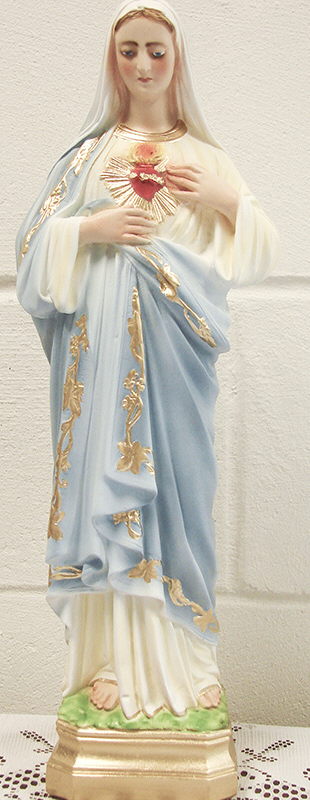 |
Immaculate Heart - Ivory - 18 |
Sacred Heart of
Jesus - 18 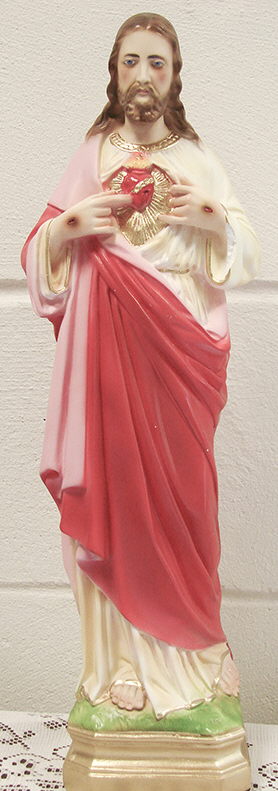
|
|
Our Lady of Lourdes - 18 |
Our Lady of Mt. Carmel - 18 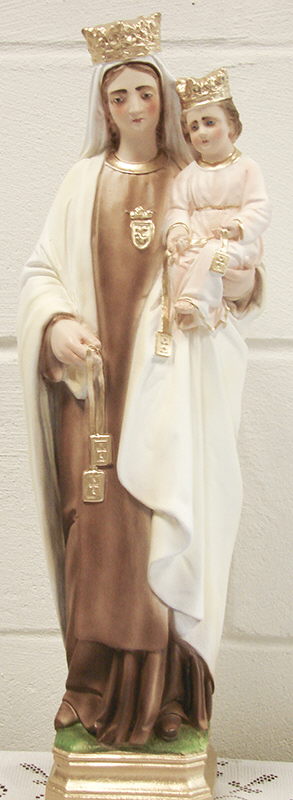 |
Our Lady of Grace - 18  |
|
St. Francis - 18 |
St. Anthony - 18 |
St. Joseph - 18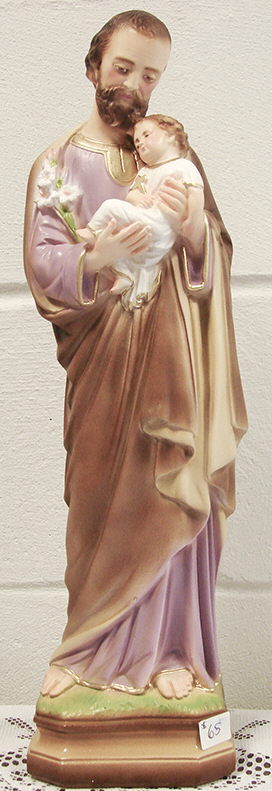 |
|
St. Therese - 18 |
Our Lady of Guadalupe - 12 |
St. Clare - 12 |
|
|
|
|
St. Padre Pio -
12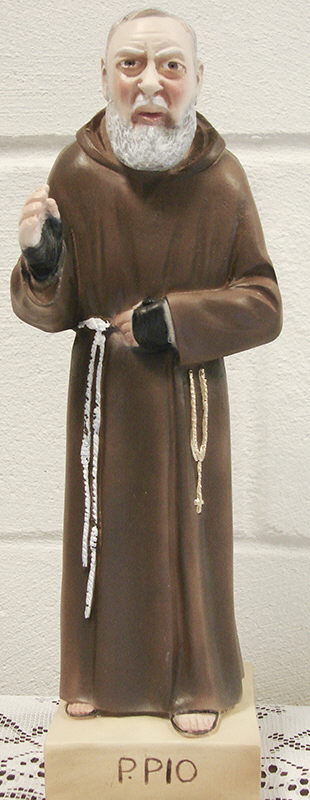
|
St. Rita - 12
|
Divine Mercy - 12
|
|
|
|
|
|
Pieta - Color |
Pieta - Marble 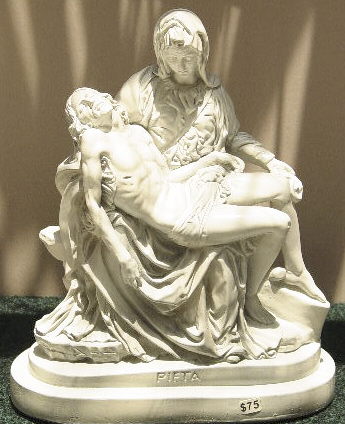
|
Limpias - 8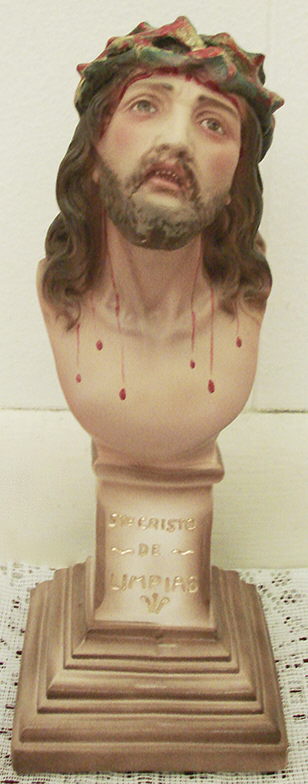 |
|
Fatima w/glass - 11 |
Pilgrim Virgin
w/glass - 12 |
Pilgrim Virgin
w/glass - 15 |
|
|
|
|
|
Fatima w/glass - 18 |
Pilgrim Virgin w/glass - 18 |
Pilgrim Virgin
w/glass - 27 |
|
|
Toll free - 1-888-211-3041 |
| Size | Price | Quantity | |
|
Holy Family |
24" |
$180 |
|
|
Immaculate Heart of Mary |
24" |
$125 |
|
|
Immaculate Heart - Ivory |
24" |
$125 |
|
|
Infant of Prague |
24" |
$125 |
|
|
Limpias |
24" |
$125 |
|
|
Our Lady of Grace |
24" |
$125 |
|
|
Our Lady of Guadalupe |
24" |
$125 |
|
|
Our Lady of Lourdes |
24" |
$125 |
|
|
Our Lady of Mt. Carmel |
24" |
$125 |
|
| Sacred Heart of Jesus |
24" |
$125 |
|
| Sacred Heart of Jesus -Blessing |
24" |
$125 |
|
|
Sorrowful Mother |
24" |
$125 |
|
|
St. Anthony |
24" |
$125 |
|
|
St. Claire |
24" |
$125 |
|
|
St. Francis |
24" |
$125 |
|
|
St. Joseph |
24" |
$125 |
|
|
St. Jude |
24" |
$125 |
|
|
St. Padre Pio |
24" |
$125 |
|
|
St. Therese |
24" |
$125 |
|
| Angel |
22" |
$100 | |
| Divine Mercy |
22" |
$100 | |
| St. Philomena |
20" |
$100 | |
| St. Philomena |
16" |
$65 | |
| Immaculate Heart of Mary |
18" |
$65 | |
| Immaculate Heart - Ivory |
18" |
$65 | |
| Sacred Heart of Jesus |
18" |
$65 | |
| Our Lady of Lourdes |
18" |
$65 | |
| Our Lady of Mt. Carmel |
18" |
$65 | |
| Our Lady of Grace |
18" |
$65 | |
| St. Joseph |
18" |
$65 | |
| St. Francis |
18" |
$65 | |
| St. Anthony |
18" |
$65 | |
| St. Rita |
18" |
$65 | |
| St. Therese |
18" |
$65 | |
| Pieta - Color | 15" | $75 | |
| Pieta - Marble | 15" | $75 | |
| Holy Family |
12" |
$60 | |
| Our Lady of Guadalupe |
12" |
$40 | |
| St. Padre Pio |
12" |
$40 | |
|
St. Rita |
12" |
$40 | |
| Divine Mercy |
12" |
$40 | |
| St. Claire |
12" |
$40 | |
| Limpias |
8" |
$25 | |
|
Fatima w/glass |
11" |
$150 | |
|
Fatima w/glass |
18" |
$250 | |
| Pilgrim Virgin w/glass |
12" |
$160 | |
| Pilgrim Virgin w/glass | 15" | $200.00 | |
| Pilgrim Virgin w/glass | 18" | $250.00 | |
| Pilgrim Virgin w/glass |
27" |
$450.00 |
|
|
|
|
Name |
Sub-Total |
|
Address |
IN Tax (7%) |
|
City |
Shipping |
|
State
Zip |
Donation |
|
Telephone |
Order Total |
Available for $750.00
Fatima/Clearwater Glass Statues available.Call or go to China
1-888-211-3041
6015 N. State Rd 62
China, IN 47250
or call Clearwater
21649 US 19 N
Clearwater, FL 337651-888-321-7671
1-727-725-9312
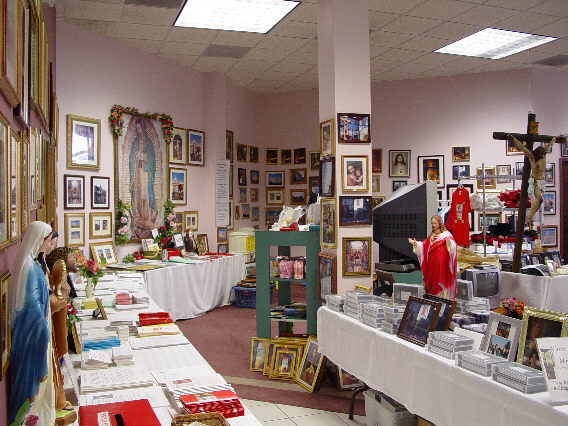
Brand New Internet Store